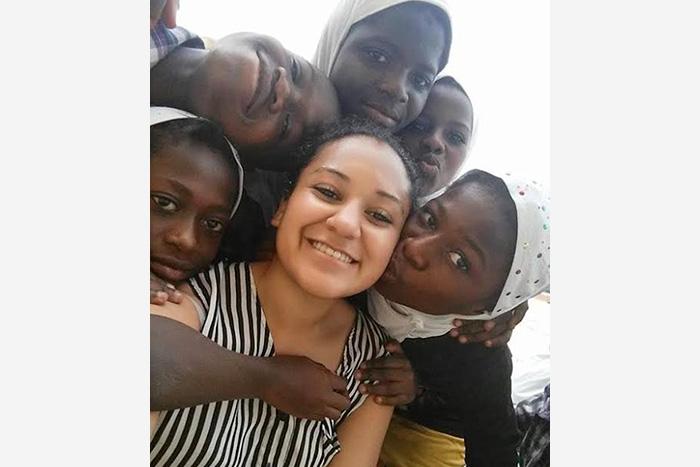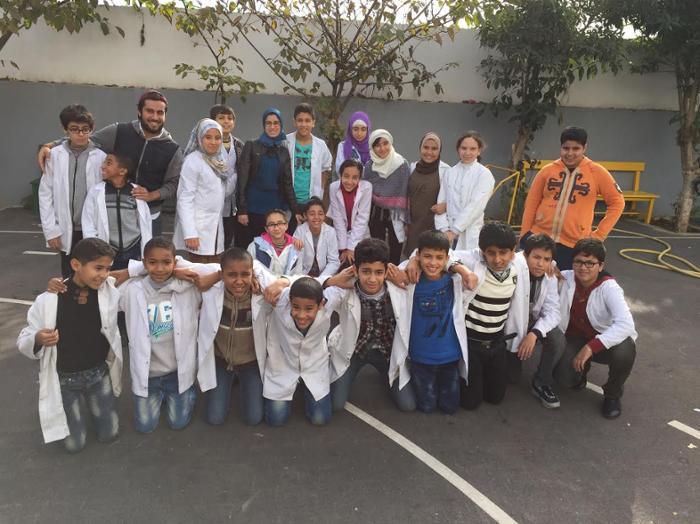Aubrey Griffin ’17 had always planned to pursue a career in global public health. An anthropology and political science major, Griffin was interested in the education and research side.
Her focus shifted last month, though, after she spent time at schools, clinics and orphanages in Dodowa, on the outskirts of Accra, Ghana’s capital city. There, the Boston woman helped treat babies and children afflicted with malaria, ringworm and other ailments. She weighed them, cleaned and dressed their wounds and administered vaccines in a region with limited access to healthcare.
“I loved this hands-on approach to public health,” said Griffin. “To be able to help people and to be able to give something back made me realize I wanted to pursue a nursing degree after graduating.”
Griffin is among the first group of Union students who spent three weeks over winter break as Klemm Fellows. The program places students in a foreign country where they stay with a host family and work for a local organization. Most costs are covered by the Klemm Fellow International Internship Program.
In addition to Griffin, the others include:
Kritika Amanjee ’18 (medical internship in Guadalajara, Mexico)
Zibusiso Dhlamini ’16 (teaching English and other subjects in San Cristobal Island, Galapagos, Ecuador)
Roswald Morales ’16 (teaching English in Rabat, Morocco)
Anabel Reyes-Ovalles ’16 (human rights internship in Ulaanbaatar, Mongolia)
The five were selected from among nearly three dozen students who applied, according to Lara Atkins, director of International Programs. Students were required to submit an essay and maintain a minimum GPA of 3.2 GPA.
Faculty mentors were Erika Nelson, associate professor of German; Tom Lobe, lecturer in political science; and Mark Dallas, assistant professor of political science.
“The program differs from study abroad in that it’s not an academic experience per se,” said Atkins. “The students didn’t take courses. That wasn’t the point. It’s experiential learning. And their experiences have been inspirational.”
Amanjee, a biology and Spanish major from Sacramento, Calif., spent time in maternity wards at local hospitals, where she witnessed childbirth under difficult circumstances. The experience was unforgettable.
“I got such a rush,” she said. “It was so beautiful.”
The fellows were not without challenges. Some struggled with the language in their host countries. Resources were often scarce. And nearly all thought three weeks was not enough time to realize the program’s potential.
For Reyes-Ovalles, weather the toughest obstacle. Average December temperatures stalled at seven below, and the thermometer rarely eclipsed single digits – tough even for someone fluent in the climate of the Northeast.
“It was way too cold,” joked Reyes-Ovalles, a political science and American Studies major from Lawrence, Mass. She worked alongside lawyers and social workers focused on environmental issues, helping translate documents, among other tasks.
Outside of work, fellows frequently traveled or immersed themselves in the local culture. A mechanical engineering major from Bulawayo, Zimbabwe, Dhlamini played soccer and took salsa lessons at night. He spent his days in the classroom teaching English to students ages 8 to 13.
Fellows also enjoyed sampling the local culinary offerings.
“I ate a lot of bread and drank a lot of tea,” said Morales. “The tea in Morocco is great.”
As the first group of fellows, Morales and the others found the experience rewarding, and encourage other students to apply for a Klemm Fellowship.
“Terms abroad can spoil you,” said Morales, who spent a semester soaking in the rich culture of France. “Visiting Morocco, and some other places which are impoverished, can be a very humbling experience. You learn a lot about yourself.”
The program is funded through the Professor Frederick A. Klemm and Eleanor G. Klemm Fund for International Study and Service.
A professor emeritus of German, Klemm was considered the father of Terms Abroad at Union. He inaugurated the College’s program by guiding a group of 28 students to Vienna, Austria, in spring 1969. He died in 2010. He was 97. Eleanor died in 2004. The couple was committed to supporting students pursuing international careers in service.
Today, more than 60 percent of Union’s students enjoy an international study experience in dozens of countries across the globe.
“We are so thankful that through the generosity of the Klemm Fund, we are able to offer these types of experiences to our students,” Atkins said.

